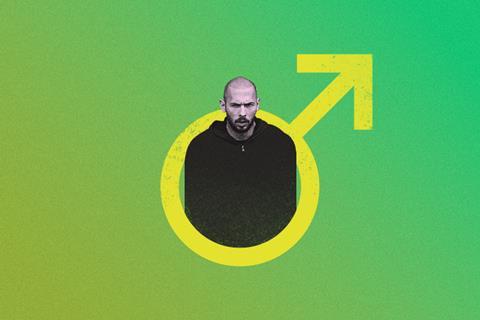Claire Hailwood is dismayed at Andrew Tate’s popularity and plans to fight back

I can’t remember when I first heard the name Andrew Tate, instead, it was more a creeping awareness of the name and some of the furore surrounding him. Initially I didn’t think much of it – another flash in the pan social media influencer with some problematic views – if I worried about each of those I’d never do anything else. However as time has gone on, I’ve realised that this is not ‘just’ an influencer with some views that are offensive.
Andrew Tate is a self-proclaimed misogynist, former world champion kickboxer and self-made millionaire with upwards of 3.5 million followers on twitter, with over 11.6 billion views of videos of him on TikTok, and a worldwide following online.
To say that Tate holds misogynistic views is, in this case, not a full enough picture. His widely publicised and promoted beliefs including stating that women are intrinsically lazy, belong in the home and are a man’s property. His views shared in videos extend to appalling details outlining violence towards women, the details of which I won’t repeat here.
So why and how does a man with such appalling views become so popular? How did he become so prolific online?
Tate presents himself as a self help guru, with a passion to help his followers make money through various investment schemes including cryptocurrency. In some of his videos he appears to be funny, straight talking and seemingly harmless. He boasts of his ability to help his, predominantly male fans, ‘pull girls’ and make money, encouraging their participation in his private online academy called ‘Hustler’s University’. In August 2022, figures showed 127,000 members paying £39 a month to join that community.
Although disturbing, his rise has also been skillful with Tate deliberately seeking to use social media algorithms to his advantage, encouraging followers to create and share the most salacious, controversial clips to increase their traction online. It’s a strategy that’s worked. Greater controversy has come with greater reach, especially on TikTok.
Despite being banned on Facebook, YouTube, Instagram, TikTok and twitter, over the summer of 2022, in my world it felt like most young people were talking about videos they’d seen of him or promoting him or his views, despite many of them not actively searching for it.
One 13-year-old girl told me that her (male) friend had yelled at her that if she spoke to him like that again he’d ‘Andrew Tate’ her. She had celebrated winning a game of UNO, and before that moment hadn’t heard of Andrew Tate.
That’s the juxtaposition of dangerous, adult incendiary content and young teenage impressionable minds. During adolescence young people are figuring out who they are and where that identity is rooted. They’re being formed constantly and it’s a previously but hugely vulnerable time.
In videos that are hugely appealing visually, amidst fast cars and flashy possessions, it’s unsurprising that young people may linger on videos, only to fall prey to what the algorithms do. They gradually find their ‘for you’ feed fuller of misogynistic content, with some more troubling viewpoints taking root in their lives, particularly as it accompanies the hope of ‘pulling girls’ for young men who may be wondering how to do that or feeling inadequate to the task.
I can understand why repeated warnings are being issued from domestic violence charities of the radicalizing impact this is having on young men.
On December 29th 2022, Tate was arrested in Romania amidst investigations into human trafficking, organised crime and rape, and once again the headlines were filled with his name and social media with versions of events proffered by various individuals. To date him and his brother continue to be detained.
I’m appalled at what so much of this rhetoric means for girls, for my daughters. In a world where I long to encourage and inspire them to pursue all that God has placed in them, there are more opportunities than ever before, to be faced with blatant, violent hatred in headlines, content and words in the school playground. It pains my heart.and makes me worry for their safety and to think again about how to prepare them for a world where such hatred exists.
I’m as disturbed and troubled for boys, for my sons. I want them to grow up to pursue all that God has placed in them too, where they can become the men that he created them to be. But in a world were Tate and the many like him are held up as an example as those who ‘have it all’ and where being a man is portrayed in this one dimensional, abhorrent way, I worry for them too, for their safety and their ability to stand up for what’s right in the face of such strong forces against.
So here are five things I’m doing which might help you as you respond.
1. Demystify the algorithm
We need to stop being scared into silence because we may not understand the working intricacies of social media platforms and their algorithms. We don’t need to be a computer programming expert to have a good enough picture of how social media works so that we can have a meaningful conversation with our teenagers.
We need to talk about what content is favoured – that which is emotive or causes a great reaction - and how we unsuspectingly play our part.
We can equip and remind one another of the tools available to us such as tapping ‘I’m not interested’ on the various reporting tools for inappropriate content where necessary.
Encourage the teenagers in your world to question everything they see – why are they being shown that video, where does it come from and why? One of my favourite things about teenagers (mostly) is their feistiness and willingness to get behind something they believe in (or want to stand against). I want to harness that and put it to good use!
2. Genesis 1 principles
Then God said, “Let us make mankind in our image, in our likeness…so God created mankind in his own image, in the image of God he created them; male and female he created them (v 27)Both men and women are made in the image of God, created equal with differences and similarities.
In home, friendships, marriages, in churches and community, you can model and talk about what you see that is good and godly.
Celebrate the differences between men and women without stereotyping. Celebrate examples of working together in relationships where one complements the other in different ways and spaces.
Confront any uncomfortable examples in your own life where there are tendencies towards treating women unequally, even in ‘banter’ in the home, involving you and / or your teenagers. Confront and do things differently, remembering the principles of equality in Genesis 1:27.
3. Don’t be afraid to set boundaries
As a responsible adult in the life of children and young people, it’s my job to hold and explain healthy boundaries, even when they’re unpopular.
Having a phone and access to the internet is a privilege not a right in our home, and comes with some responsibility and conditions attached. We do our best to talk about it so it doesn’t push the desire ‘underground’. We review regularly, acknowledge when we’re wrong, adjust according to age and stage, but we hold firm because it matters too much to give in.
4. Whatever is good….think on these things
Whatever is true, whatever is noble, whatever is right, whatever is pure, whatever is lovely, whatever is admirable–if anything is excellent or praiseworthy–think about such things (Philippians 4:8)
I’m not sure I’d always frame it as this verse does in conversation with my teenagers, but I love the principles of this verse. As a parent I want to give my children opportunities and fill their lives with people and examples that are really great so that they can fix their attention and heart on more of these things that reflect more of God than the world – fun, adventure, laughter, relationship, community. I want these things to delight their hearts more than the pull of the secretive, isolating world of the internet. I need to model that too.
5. Pray
For my children, for those entrusted to me, our church and community. For our nation and wider afield
And this includes for Andrew Tate and others like him, remembering that our struggle is not against flesh and blood, but against the rulers, against the authorities, against the powers of this dark world and against the spiritual forces of evil in the heavenly realms.
And that perspective gives me comfort and perspective which might otherwise be hard to find!




































